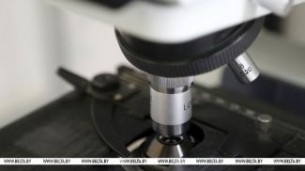Eng
- Address:
231391, Voronovo, 34 Sovetskaya str.
- E-mail:
rik@voronovo.gov.by
- Tel.: (8-015-94)-21273
- Tel/fax: 8-(015-94)-21953
13.08.2021
Belarus’ researchers determine domestic COVID-19 vaccine strategy

Belarusian scientists have
determined the strategy for the domestic coronavirus vaccine, Director
of the National Research Center for Epidemiology and Microbiology
Vladimir Gorbunov told reporters, BelTA has learned.
“The National Research Center for Epidemiology and Microbiology, in collaboration with the Academy of Sciences of Belarus, has developed a whole-virion inactivated COVID-19 prototype vaccine. Preliminary tests are currently underway. These are preclinical studies. In vitro studies and animal testing (on groups of mice) of the vaccine obtained from several variants - Indian, British and some others - have been carried out. We analyzed the findings and concluded that the serums obtained from corresponding variants are predominantly effective against these variants. We have not established high cross-activity. Thus, our developers, scientists have decided on the domestic vaccine strategy. We will focus on the vaccine based on the variants currently circulating in our country,” Vladimir Gorbunov noted.
"There is no universal vaccine that will be good against all variants. The vaccine will be constantly adjusted to better target new variants,” Vladimir Gorbunov said.
According to him, the prototype vaccine is ready. Ahead are preclinical trials and then clinical trials. After that we will get the manufacturing site ready to launch the production. "We believe it will take a year, perhaps a little more," Vladimir Gorbunov said.
He added that the initial plans are to make a single-dose vaccine. “We assume it will be a single-dose vaccine at first. Perhaps it will be a combination of several virus variants. Or it will be a different variant each time depending on the circulating virus. We are currently working on a platform that will produce a specific vaccine against a virus variant circulating at a specific time. This is the advantage of our approach,” said Vladimir Gorbunov.
“The National Research Center for Epidemiology and Microbiology, in collaboration with the Academy of Sciences of Belarus, has developed a whole-virion inactivated COVID-19 prototype vaccine. Preliminary tests are currently underway. These are preclinical studies. In vitro studies and animal testing (on groups of mice) of the vaccine obtained from several variants - Indian, British and some others - have been carried out. We analyzed the findings and concluded that the serums obtained from corresponding variants are predominantly effective against these variants. We have not established high cross-activity. Thus, our developers, scientists have decided on the domestic vaccine strategy. We will focus on the vaccine based on the variants currently circulating in our country,” Vladimir Gorbunov noted.
"There is no universal vaccine that will be good against all variants. The vaccine will be constantly adjusted to better target new variants,” Vladimir Gorbunov said.
According to him, the prototype vaccine is ready. Ahead are preclinical trials and then clinical trials. After that we will get the manufacturing site ready to launch the production. "We believe it will take a year, perhaps a little more," Vladimir Gorbunov said.
He added that the initial plans are to make a single-dose vaccine. “We assume it will be a single-dose vaccine at first. Perhaps it will be a combination of several virus variants. Or it will be a different variant each time depending on the circulating virus. We are currently working on a platform that will produce a specific vaccine against a virus variant circulating at a specific time. This is the advantage of our approach,” said Vladimir Gorbunov.
Vladimir Gorbunov emphasized
the importance of vaccine production in Belarus: “It has great
prospects. It means the country’s biosafety. The facility will also
produce other drugs, not only coronavirus-related ones. I believe that
this investment of funds and efforts will definitely pay off.”







